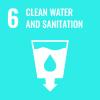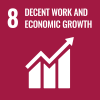Sabit pulls the pipe connected to the desludging tractor to one of the male latrines. Photo: IOM/Nabie Loyce
Malakal – Some 30,000 internally displaced people have fled danger from years of communal violence to live at a United Nations’ Protection of Civilians (PoC) site here in South Sudan. But a daily danger still lurks, often from something virtually everyone who arrives here carries inside.
Human waste and its treatment are unavoidable subjects everywhere people gather. In places like Malakal—where men, women and children all face health care challenges under stressful conditions—waste management can be the difference between well-being and a raging contagion such as cholera.
Mishandled, human waste can be as lethal as bullets or bombs.
“It takes commitment, courage and determination to do this work,” says Sebit Michael, one of 27 locally recruited members of the Liquid Waste Management Team working for the International Organization for Migration (IOM) in Malakal.

Sabit directs the driver to park the tractor properly so that the waste does not spill out of the pond. Photo: IOM/Nabie Loyce
The unit—also known as the Desludging Team—is responsible for emptying and maintaining more than 1,200 pit latrines in the PoC site, each in use dozens of times each day.
“When I started, my friends used to laugh at me, saying that I was doing a dirty job. Some even used to say that I smell,” says Sebit, who is 36 years old. “But the love I have for my community kept me going. I knew my job was saving lives. I tell my friends it is better to do this job than to go around stealing.”
This morning Sebit is pulling a heavy long pipe connected to the desludging tractor visiting one of the male pit latrines. Desludging starts with emptying the latrines into the tanks attached to the tractor and taking the contents for disposal in a waste stabilization pond about a mile and a half away.
IOM built the disposal ponds to have a combined volume of over 8,600 cubic meters. Each contains tons of sludge that the 30,000 inhabitants of the Malakal PoC site replenish daily. It takes almost an hour for Sebit and his team to pump out the sludge from one latrine site and remove the waste to the ponds, then return to the next latrine.
Sabit and the driver ready for another round of the desludging process. Photo: Nabie Loyce/IOM2020
“This is not your everyday type of job. You cannot do this work if you do not have a strong heart and the love to keep your community safe,” says Sebit as he connects his pipe to another latrine. Wearing long gloves and a mask, he signals the desludging tractor’s driver to activate a generator. In this spot, it takes just ten minutes to empty the latrine.
“This work is very essential in keeping good sanitation within the PoC,” explains Onekalit James, IOM South Sudan’s Water, Sanitation and Hygiene (WASH) Assistant Engineer. “It is the very basis of our hygiene promotion activities. Without this work, there would be serious breakout of diseases due to poor hygiene.”
There are two deep ponds—also known as “anaerobic” ponds—where the waste breaks down, and one shallow, “facultative” pond, where IOM monitors chemical reactions and water temperature, and water stability and acidic measures are done. Drainage channels take the water away.
“Since their construction in 2015, the waste stabilization ponds have been effective in leading to the reduction of a number of disease outbreaks, especially in the PoC site,” adds IOM’s Onekalit James.

Sabit poses for a photo on the tractor. Photo: Nabie Loyce/IOM2020
“We are lucky today; no non-biodegradable material inside the latrine, which is often the main challenge we get,” Sebit says matter-of-factly as he retracts his pipe. “Usually, I would have to the stop pumping the latrine to dig out the solid waste. That slows down our work.”
Heading towards a disposal pond, an unpleasant smell indicates we are getting close. Sebit quickly climbs down from the tractor and directs the driver to park the vehicle carefully so no waste spills out from the ponds.
Opening the lid of the tractor’s tank, Sebit again signals his driver. A power gear revs and a greenish substance starts to pour into the pond. Now the unpleasant smell grows even stronger. But Sebit waits patiently by the tank to ensure it is completely empty.
IOM South Sudan’s waste stabilization project under the WASH unit is supported by the United States Agency for International Development (USAID) Bureau for Humanitarian Assistance (USAID BHA), Foreign, Commonwealth and Development Office (FCDO) and European Civil Protection and Humanitarian Aid Operations (ECHO).
This article was written by Nabie Loyce, IOM South Sudan Media and Communications Assistant.


